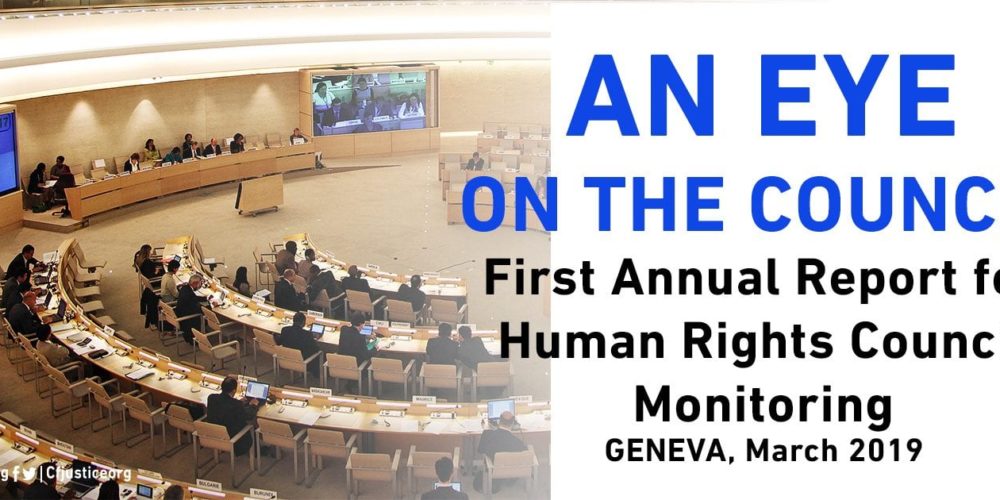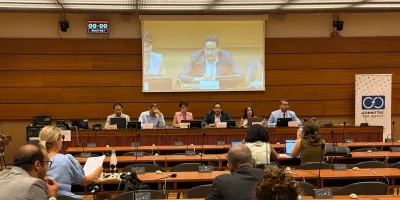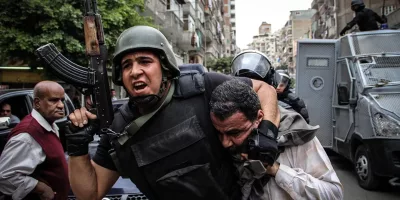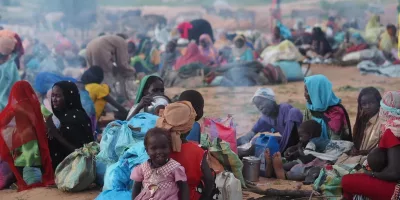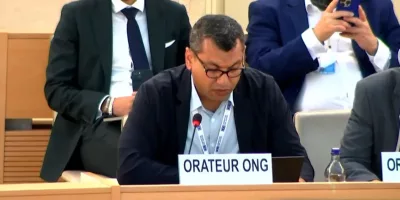February 12, Geneva, February 2019, this year, Committee for Justice issues its first annual report covering 2018 under its project “Human Rights Council Monitor”, in the context of presenting the human rights situation in the Middle East and North Africa (MENA) Region.
The report sheds the light on data, circumstances, reports, urgent appeals, states activities and most prominent resolutions issued by the Office of High Commissioner for Human rights (OHCHR) in 2018. The report concludes with several recommendations towards a safer and more efficient human rights work in the region.
“We aim through this project, with its various outputs including this report, to inform human rights organizations and human rights defenders in the MENA region, of the work undertaken by the UN mechanisms. This would help support their work in putting pressure on governments of the region to implement relevant resolutions and recommendations. Afterwards, a follow up can be undertaken through informing the mechanisms of actions done by these governments in such regard,” said Ahmed Mefreh, the executive director of Committee for Justice.
MENA countries registered a notable presence during the 2018 Human rights Council sessions. The OHCHR delivered 56 statements to the countries of the region, while the Special Rapporteurs issued 82 urgent appeals to countries of the region, based on CFJ’s monitoring process.
Egypt came first in terms of data, reports and urgent appeals issued by the OHCHR, with 13 press releases, and 13 urgent appeals.
Occupied Palestinian territories and Israel came second with 9 press releases and 11 urgent appeals followed by Saudi Arabia with 7 press releases, and 11 urgent appeals.
According to monitored data, Egypt also maintained the lead regarding work undertaken by two UN working groups, which are the UN Working Group on Arbitrary detention (WGAD) and the Working Group on Enforced and Involuntary Disappearances (WGEID), with a total of 126 opinions/decisions made; 5 opinions concerning arbitrary detention and 121 opinions on enforced disappearances.
Morocco came second regarding legal opinions undertaken by the WGAD with a total of 5 opinions, while Syria came second about refers made by the WGEID with 61 decisions.
Shaimaa Aboelkhir, advocacy and media officer at Committee for Justice said that” the number of appeals and statements issued by the UN mechanisms regarding the crackdown on human rights defenders in the region underlines that defending human rights has become one of the most dangerous activities in the region and exposes the official claims of different governments in the region about their support for human rights issues, which human rights defenders work on improving”.
Targeting human rights defenders was the leading topic addressed, reflecting the reality of the situation of human rights in the region. As human rights defenders work on improving the situation in the region, they pay the price of their struggle and human rights work. Arbitrary detention and enforced disappearances came second, registering a clear presence in the list of press releases and urgent appeals.
Extrajudicial, arbitrary and summary executions were frequently present as one of the evident violations. The Special Rapporteurs registered their strong rejection to such violations and called on the countries of the region to comply with international demands to establish a moratorium on executions, and to abide by international standards of fair trial.
Environmental issues also had a clear presence on the sideline of violations, particularly in Lebanon, where the Special Rapporteurs criticized the ineffective measures undertaken to address continued and widespread burning of wastes, including toxic wastes, in Lebanon, and the insufficient data available regarding its health impact.
Women rights and minority rights were among the most prominent demands presented through press releases and statements by the OHCHR, along with calls for ending discrimination, upholding the rule of law and achieving equality.
Violations targeting freedom of expression and demonstrations were not absent from the positions and activities of the Commission, as it represented a clear focus in 2018.
In 2018, the Working Group on Arbitrary Detention issued 14 resolutions concerning the Middle East and North Africa region.
During its 81st session which took place in Geneva from 17 to 26 April 2018, the Group adopted 39 legal opinions, of which 10 opinions concerned the region: 3 on Egypt, and 7 opinions concerning 7 other countries: UAE, Morocco, Mauritania, Iraq, Libya, Qatar and Israel.
On its 82nd session, which took place in Geneva from 20 to 24 August 2018, the Working Group also adopted 24 legal opinions, of which 4 concerned the region: 2 on Egypt and 2 on Morocco.
The Working Group on Enforced or Involuntary Disappearances also issued 185 decisions concerning the region out of a total of 330 decisions of referral or clarification.
At its 114th session, which took place from 5 to 9 February 2018, covering the period between its 113th and 114th sessions, the Working Group transmitted under its ‘urgent action’ procedure 122 referral decisions. Of those, there were 89 referral decisions concerning the region spread as follows: UAE (1), Lybia (2), Egypt (82), Saudi Arabia (1), Mauritania (1), Sudan (2) and the Syrian Arab Republic (1).
While at its 115th session, which took place from 23 April to 2 May, covering the period between its 144th and 115th sessions, the Working Group transmitted under its ‘urgent actions’ procedure, 50 refers of which 44 concerned the region as follows: UAE (1), Libya (2), Egypt (39) and Saudi Arabia (1).
Many countries of the MENA region participated in the decision-making processes of the Human Rights Council, amounting to 19 resolutions out of a total of 132 adopted across the three sessions. The presence of Egypt, Tunisia, Morocco and Qatar was notable.
The Syrian crisis has been the subject of several adopted resolutions across the three sessions, while the Council held a special session regarding Israel’s violations in Gaza Strip during the great march of return, in which many Palestinian victims died.
At the HRC 37th session which took place between 26 February and 23 March 2018, countries of the region engaged in 7 resolutions out of 61 adopted resolutions, as for the 38th session of the HRC which took place from 10 September 2018 to 28 September 2018, countries of the region engaged in 4 resolutions out of 31 adopted resolutions.
The Human Rights Council also held its 28th special session on “The deterioration of the human rights situation in the occupied Palestinian territories, including East Jerusalem”, which took place on 18 May, where it adopted a resolution condemning Israel’s violation of international law in the face of widespread civil protests in the Occupied Palestinian Territories, including East Jerusalem.
The Council also addressed a letter dated 15 May 2018 directed to the President of the Council by the Permanent Representative of the UAE and Permanent Observer of the State of Palestine to the United Nations Office and other international organizations in Geneva, on violations targeting civilians, specially deliberate killing.
The United Nations High Commissioner for Human Rights at the time, Zeid Ra’ad Al-Hussein, delivered a comprehensive speech on 18 May 2018, in which he explained that the appalling violence in Gaza had led the Council to convene that special session.
Committee for Justice calls – through the recommendations in this report – for the adoption of an international human rights initiative led by the United Nations High Commissioner for Human Rights, which works on ending the targeting of human rights defenders in the Middle East and North Africa region in a step to further globalize such initiative.
It also calls for adopting a clear definition for the concept of terrorism and to classify terrorism committed by dictatorial regimes in the region as a form of terrorism, under the concept of “state terrorism”. This should take place, in view of some regimes abusing the terrorism term and putting human rights defence under a new category of “Rights terrorism”, which is specifically what happened in Egypt. Also, more decisive and effective steps should be taken with relation to committed war crimes and genocides, mentioning specifically here Yemen, Syria, Sudan, Egypt and the occupied Palestinian territories.
Committee for Justice stresses on the importance of activating an international system for the protection of human rights defenders, beyond the system of monitoring and documentation through issuing a UN resolution, with the support of the OHCHR, that provides international immunity to people working in the field of human rights. A system which surpasses internal politicized laws which are largely controlled by regimes involved in violations. In addition, the OHCHR should intervene urgently and firmly in line with mandate of international mechanisms, to stand by human rights defenders in the region and to release the detainees.
Committee for Justice had published its coverage of the work of the Human Rights council throughout the last year, both in Arabic and in English, with more focus on Arabic, to provide a learning tool and a database for information related to the human rights situation in the MENA region, from the perspective of UN mechanisms.
For more information in Arabic and English kindly call us: +41 22 94053 38
+41 22 94053 38

